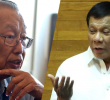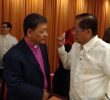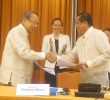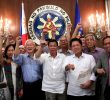
Fidel Agcaoili, NDFP chief negotiator (third from left) during the signing of the supplemental guidelines of the Joint Monitoring Committee on Saturday, Jan. 21, in Rome, Italy. (Zea Io Ming C. Capistrano/davaotoday.com)
ROME, Italy — National Democratic Front of the Philippines Negotiating Panel chairperson Fidel Agcaoili is not totally closed to the idea of forging a bilateral ceasefire agreement with the Philippine government.
During the signing of the Joint Monitoring Committee supplemental guidelines on Saturday, Jan. 21, Agcaoili was asked whether there will be a signing of a joint ceasefire agreement to which he said: “I’m not saying that there won’t be or there will be, it’s something that depends on the GRP (Government of the Philippines).”
“I’m saying that there are things that we can talk about. Now it depends on what we’re going to talk about, what they can give,” Agcaoili said.
“That can be worked out provided the conditions for such a ceasefire are complied with. We have raised the question of continuing militarization in the countryside, the occupation of schools, day care centers, even private residences,” he added.
Test
The NDFP stressed that the “first big test” of the sincerity of the government is its adherence to the Comprehensive Agreement on Respect for Human Rights and International Humanitarian Law, the first substantive agenda agreed to by both Parties in 1998 peace negotiations.
“I need to state very clearly that the full implementation of CARHRIHL requires the release of the 392 political prisoners immediately because they are charged with common crimes,” said Agcaoili.
“Some of them were asked to withdraw their appeals so they should really be released immediately,” he said.
Agcaoili cited the case of three NDFP consultants Eduardo Sarmiento, Emeterio Antalan and Leopoldo Caloza who remain in prison.
He said to facilitate their release, the GRP suggested that they withdrew their appeals to allow the granting of a presidential pardon. But he said the conviction of the three became final and they have not been pardoned yet.
“This constitutes not only a serious violation of CARHRIHL and JASIG but a betrayal of trust,” Agcaoili said.
However, the government panel explained that the release of the prisoners must undergo judicial processes, a tact not acceptable to the NDFP.
NDFP lawyer Edre Olalia in a Facebook post said, “Govt claim of inordinate delay in release of political prisoners purportedly due to its judicial & legal processes is a flimsy, worn-out & regurgitated buckpassing that smokescreens its own gross & inexcusable negligence, incomparable inefficiency & unmitigated insensitivity, if not a premeditated scheme. Expediting releases is not an impossible dream made into fantasies by pretentious & incorrigible spin masters.”
In a previous statement he had already maintained that: “In the end, more than complying with peace agreements, fulfilling multiple & varying pledges, & showing goodwill and building confidence, the immediate release of political prisoners who are essentially victims of injustice is a moral imperative — especially those dying, ailing, sick, elderly, long-termers, women, minors — that should not be subjected to the usual, customary & routinary processes and timeline.”
Trumped up charges
Agcaoili in a statement said the government has retained “repressive Marcos decrees” used against NDFP members and civilians.
“Alleged NDFP personnel when arrested, are routinely slapped with non-bailable charges such as illegal possession of firearms and explosives to keep them perpetually detained. In most cases the firearm is planted to serve as ‘evidence’,” he said.
The NDFP claimed that charging NDFP forces with common crimes is a violation of the Hernandez political offense doctrine, a principle under the CARHRIHL, which the government signed.
‘Oplan Kapayapaan’
Agcaoili also requested the government to provide them a copy of the new security plan, Oplan Kapayapaan.
“It may help us to nearing the working out of a bilateral ceasefire,” he said.
The previous security plan of the government Oplan Bayanihan where the military conducts peace and development projects in communities was protested strongly by the NDFP.
Agcaoili said through Oplan Bayanihan, the military occupy schools, health and day care centers, barangay halls, public plazas, and private residences in more than 43 provinces in the Philippines.
Committed
But Government chief negotiator and Labor Secretary Silvestre Bello III said President Rodrigo Duterte is determined to uphold human rights of political dissenters.
“The track record of President Duterte will speak for itself. He has always upheld the rights of political dissenters and respected their human rights,” Bello said in a statement Sunday.
“Some may find his unconventional approach in addressing peace and order issues in the country but he has always maintained high respect for political dissent,” Bello added.
Bello assured that the government will investigate the cases submitted by the NDFP and human rights group Karapatan.
Initial victory
Meanwhile, Bello III said the signing of the supplemental guidelines of the JMC under the CARHRIHL is an affirmation of the government to uphold human rights and adherence to IHL.
“I am glad that the CARHRIHL, which I was privileged to negotiate and sign with the NDFP in 1998, can now come into fruition with the adoption today of its supplemental guidelines for the full operation of its Joint Monitoring Committee,” Bello said.
He said that the signing of the supplemental agreement put into motion the operationalization of the JMC which is tasked to monitor violations and the implementation of the CARHRIHL.
“Hopefully, the JMC will expedite the forging of a bilateral ceasefire agreement that will address the alleged issues of government violations and provocative and prohibited acts of NPA rebels,” Bello explained.
He said the government also submitted complaints against NPA fighters that violated CARHRIHL provisions, including the torching of buses and heavy equipment.
He said under the JMC, the allegations of violations from both sides would be addressed.
Bello also underscored the need to forge a bilateral ceasefire agreement to determine and provide mechanism to monitor and address violations.
GRP panel JMC chairman Atty. Efren Moncupa said the JMC is now in close coordination with the AFP and police to ensure that the authorities upheld human rights.
He added: “The JMC was not operating when the panels were not negotiating. That’s why we now have on the table, a proposal from the NDFP to make the JMC work regardless of whether the panels are actually negotiating or not.”
The signing of the supplemental guidelines is the first agreement signed by both parties in this third round of talks. (davaotoday.com)









